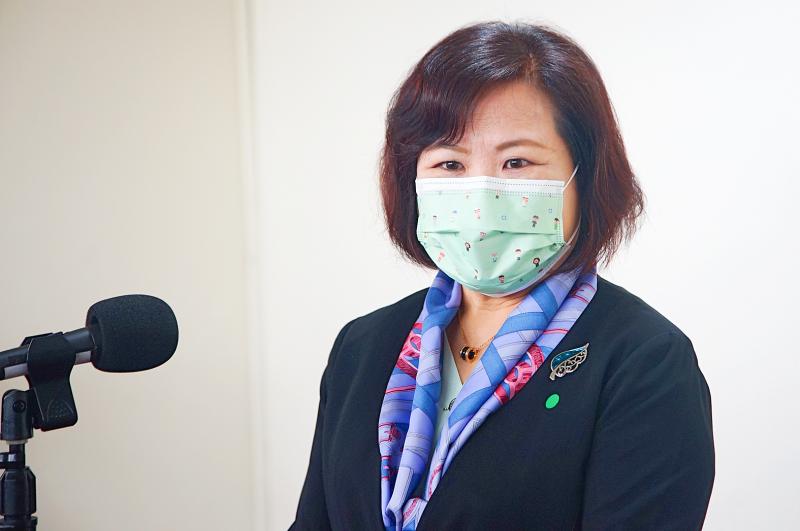Lifting an entry ban on overseas workers is being discussed, with people who are fully vaccinated against COVID-19 to be the first allowed in, Minister of Labor Hsu Ming-chun (許銘春) said yesterday, while the Ministry of Health and Welfare updated the vaccination rate in Taiwan.
“Agencies have been discussing supporting measures once the ban is lifted, and fully vaccinated migrant workers will be given priority,” Hsu said ahead of a meeting of the Social Welfare and Environmental Hygiene Committee at the Legislative Yuan in Taipei.
Arriving migrant workers would be required to present a certificate of vaccination and a negative polymerase chain reaction test result conducted within three days prior to departure for Taiwan, she said.

Photo: CNA
Once in Taiwan, they would undergo a mandatory 14-day quarantine, followed by a week of self-health management, she said, without offering any indication of when entry restrictions would be eased, except to say that it would hopefully be this year.
Ministry of Economic Affairs and health ministry officials also attended the meeting, at which they discussed labor subsidies during the pandemic after a shortage of workers that has worsened in Taiwan since a local outbreak of COVID-19 began in May.
Taiwan established an entry ban for Indonesian migrant workers in December last year as there was a serious COVID-19 outbreak there at the time.
The government has since May 19 barred all new migrant workers from entering Taiwan following a spike in local cases.
The number of migrant workers in Taiwan first exceeded 700,000 in September 2018 and in February last year exceeded 719,000, statistics from the Ministry of Labor showed.
The number fell to 699,154 in August, the data showed.
Meanwhile, Minister of Health and Welfare Chen Shih-chung (陳時中), who heads the Central Epidemic Command Center (CECC), said that the government has about 1.3 million AstraZeneca COVID-19 vaccine doses on hand, meaning it has nearly 3 million doses of all brands, which is about how many people are waiting to receive a second dose.
About 4.1 million to 4.4 million doses are to be administered in the 12th round of the national vaccination program, which is a challenging task for local governments and healthcare providers, so the CECC is grateful for their hard work, Chen said.
“Our goal is to achieve a first-dose vaccination rate of 70 percent and full vaccination coverage of 30 percent by the end of the month,” he said.
As the first-dose vaccination rate was 58.88 percent and the full vaccination rate was about 20 percent as of yesterday, 4.7 million doses, or an average of 350,000 per day, must be administered to achieve the target, Chen added.
Additional reporting by Lee I-chia

SECURITY: As China is ‘reshaping’ Hong Kong’s population, Taiwan must raise the eligibility threshold for applications from Hong Kongers, Chiu Chui-cheng said When Hong Kong and Macau citizens apply for residency in Taiwan, it would be under a new category that includes a “national security observation period,” Mainland Affairs Council (MAC) Minister Chiu Chui-cheng (邱垂正) said yesterday. President William Lai (賴清德) on March 13 announced 17 strategies to counter China’s aggression toward Taiwan, including incorporating national security considerations into the review process for residency applications from Hong Kong and Macau citizens. The situation in Hong Kong is constantly changing, Chiu said to media yesterday on the sidelines of the Taipei Technology Run hosted by the Taipei Neihu Technology Park Development Association. With

CARROT AND STICK: While unrelenting in its military threats, China attracted nearly 40,000 Taiwanese to over 400 business events last year Nearly 40,000 Taiwanese last year joined industry events in China, such as conferences and trade fairs, supported by the Chinese government, a study showed yesterday, as Beijing ramps up a charm offensive toward Taipei alongside military pressure. China has long taken a carrot-and-stick approach to Taiwan, threatening it with the prospect of military action while reaching out to those it believes are amenable to Beijing’s point of view. Taiwanese security officials are wary of what they see as Beijing’s influence campaigns to sway public opinion after Taipei and Beijing gradually resumed travel links halted by the COVID-19 pandemic, but the scale of

A US Marine Corps regiment equipped with Naval Strike Missiles (NSM) is set to participate in the upcoming Balikatan 25 exercise in the Luzon Strait, marking the system’s first-ever deployment in the Philippines. US and Philippine officials have separately confirmed that the Navy Marine Expeditionary Ship Interdiction System (NMESIS) — the mobile launch platform for the Naval Strike Missile — would take part in the joint exercise. The missiles are being deployed to “a strategic first island chain chokepoint” in the waters between Taiwan proper and the Philippines, US-based Naval News reported. “The Luzon Strait and Bashi Channel represent a critical access

Pope Francis is be laid to rest on Saturday after lying in state for three days in St Peter’s Basilica, where the faithful are expected to flock to pay their respects to history’s first Latin American pontiff. The cardinals met yesterday in the Vatican’s synod hall to chart the next steps before a conclave begins to choose Francis’ successor, as condolences poured in from around the world. According to current norms, the conclave must begin between May 5 and 10. The cardinals set the funeral for Saturday at 10am in St Peter’s Square, to be celebrated by the dean of the College